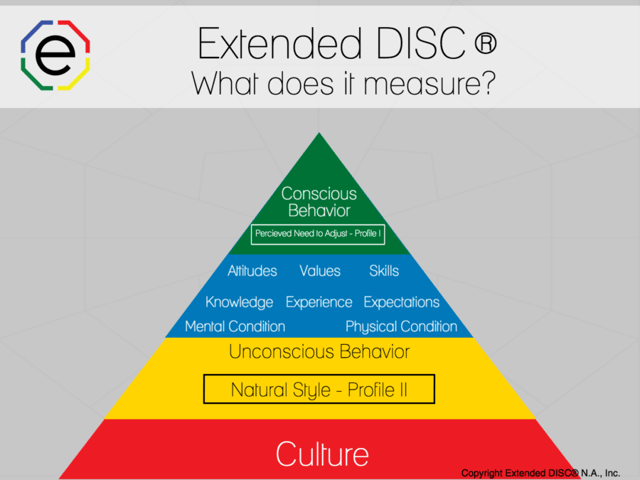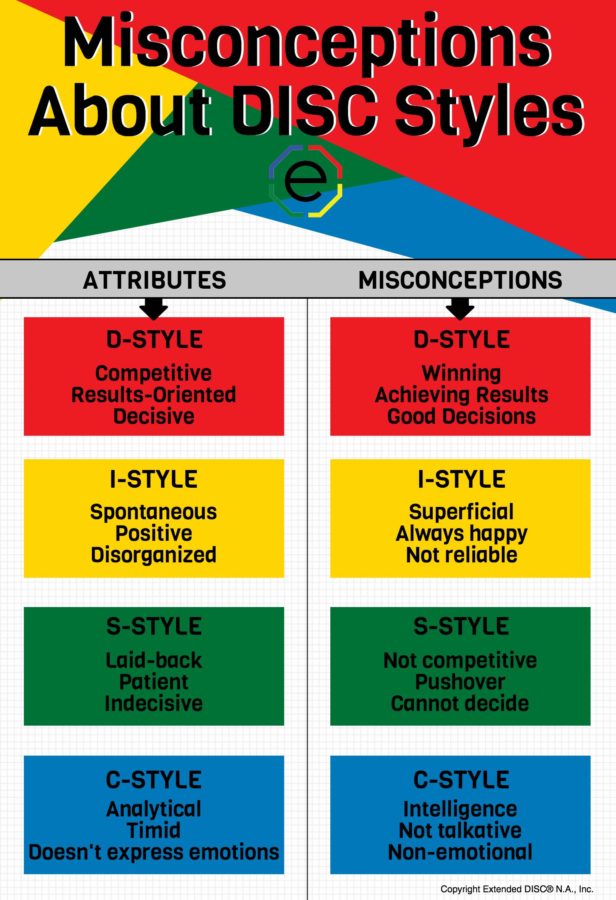We have differing views of DISC personality types based on our own perceptions. Hence, we may also have misconceptions about DISC personality types.
When we talk to other people about DISC styles we notice that people have differing views of others. They are different for various reasons. These views are sometimes inaccurate, but can grow into lasting biases and misconceptions about DISC styles.
As human beings, we make judgments on other people. We hold pre-conceived views because it allows us to make decisions about others quickly. However, they can also cloud our judgment.
How do misconceptions about DISC styles start?

Our judgments of others can become lasting beliefs. In addition, our misguided beliefs can become strong biases that can hinder our ability to interact effectively with others. Biases cloud our judgment by creating overly positive or negative beliefs. We can believe in bad behaviors of others that may not exist.
We tend to put our own behavioral style on a pedestal since we have a stronger emotional tie to our own DISC style. You can assign behavioral traits that are simply not accurate. When we do that, it becomes an obstacle to our own success.
For example, let's say that you're a sales professional. If you have misconceptions about the S-style, it can impact what you believe your S-profile prospects will and will not do. In fact, you could actually impede your sales process by applying your bias to the interaction. If you believe S-styles are indecisive, you may give up early in the sales process and lose a sale. We need to be aware of these biases so that they do not become obstacles to our own success and to people around us.
How does culture play a factor in DISC?

DISC helps us understand how we do things; how we communicate, how we lead, how we sell, etc. Sometimes, people look at DISC test results and are tempted to read too much into them. We may assign too much value to the information. We need to understand what we are actually measuring and also, what we are not measuring.
There are other factors that go into understanding DISC styles of others. We also need look at the context in which we interpret DISC assessments. For example, culture is one factor. We need to look at DISC in a cultural context. Culture can mean many things. Culture can be applied to countries, cities, companies, or even teams. For example, the phrase "fast-paced" means something different in New York City than it does in Honolulu.
What additional factors impact what does DISC measure?
Next, we need to be clear that only the Extended DISC assessments are measuring natural hardwired behaviors. The results focus on our steady and natural DISC style because it is the most accurate starting point for our development. We also look at our conscious behavior, which describes how people feel they need to adapt in their present setting.
However, we also need to address other factors such as attitudes, values, skills, knowledge, experience, etc. These factors also impact and play a role in how successful we are. Ultimately, we are trying to become more successful by modifying our behavior.
We need a starting point to understanding DISC
First, we need to understand the DISC model. DISC itself is neutral and does not make any value judgments. It does not categorize good, bad, better, or worse.
Next, DISC does not limit a person. DISC can tell us how a person prefers to do things, but it doesn't set limitations. You should not use a DISC style as an excuse. Your primary DISC style does not limit you from excelling in any aspect of your life. Someone may decide that a person cannot be a leader or sales person based on his/her DISC style. However, that is a value judgment and is not based on DISC.
We can create personal biases, which we need to be aware of, and keep them in check. Otherwise, they become obstacles to our success. Another bias is that we tend to assign more positive traits to people who are similar to ourselves, while we tend to have more misconceptions about styles that are different than our own. In addition, don't just think about your bias when viewing others, but also what misconceptions others may have about your own style.
Misconceptions about DISC: the D-style
D-style attributes may be given more value in different cultures. For example, in the United States, D-style behaviors such as decisiveness and independence tend to be given more value in leadership. In other countries or organizations, those same behaviors can be viewed as negative leadership traits.
We think of D-styles as being competitive and therefore, they must always win or be all about winning. Do you think of D-styles as being results-oriented? Are they all about getting the task done and achieving results? That may have some truth to the task-oriented D-style; however, we assume that the results will always align with the organization. That is not always true. The D-style may be focused on their own individual results and goals that you may not be aware of.
D-styles are known for making decisions very quickly. Hence, we may assume that they will always make good decisions. This is not always the case. While, they prefer to make quick decisions that may even involve some risk for a fast reward, they are also prone to make poor decisions because they do not evaluate all the alternatives. However, D-styles make the wrong decision they don't dwell on it. They move on and continue to keep making quick decisions, while assuming the risks.
Misconceptions about DISC: the I-style
I-styles are known for being spontaneous, but does that mean they are superficial? Of course not! We have all met I-styles that are very successful and have a lot of substance.
We think of I-styles as optimistic and positive. Have you ever heard of the "glass half-full?" The I-style sees the glass as overflowing! However, it doesn't mean the I-style is always happy. I-styles tend to display stronger emotions. When things are going well, the I-style sees it as things are going wonderfully. When things are not going so well, they may view it as going horribly. However, they may be more likely to hide the bad feelings because they want to be seen as positive.
I-styles are often seen as disorganized because they tend to focus more on people than on tasks. However, they can execute and be very reliable. Again, other factors must also be considered when assigning descriptors to DISC styles.
Misconceptions about DISC: the S-style
We may admire S-styles because they are laid-back and patient, but we also may label them as indecisive. They come across as slower in decision-making because they often are considering how the decision impacts people around them.
We may think they are pushovers, but they can be very stubborn and persistent. Think of a powerful and fast car like a Ferrari, which can go from 0 to 60 in 3 seconds. S-styles are more like a freight train. They are slow to get going, but they go full steam once they do. They are hard to stop until they are done. Try to keep pushing a S-style and there's a good chance you will not find a pushover. S-style are laid-back, but they have limits you may not be aware of.
Misconceptions about DISC: the C-style
We often describe C-styles as analytical and somewhat timid because they may not speak up or show emotions. However, they show emotions like everyone else, but may not express them the way other styles do. When a C-style compliments you they will do it with deep sincerity because they are more economical in their choice of words and prefer to avoid small talk.
We may have a misconception that being analytical automatically indicates intelligence. There are many intelligent C-styles, but it does not equal being analytical. They can come across as timid, but that doesn't mean they will not speak up. They can be extremely talkative; especially if it's a topic they are interested in or have knowledge about.
Self-awareness is key

Self-awareness is the key to understanding misconceptions about DISC styles. Our DISC training videos highlight some of the misconceptions about DISC. We need to be more aware that we judge and assign traits to people. Stop and think, "Is that really true?" Those misconceptions will cloud your ability to modify your behavior. Overly optimistic or negative beliefs need to be clarified and validated, or be removed.
There is a good chance that when we promote misinterpreted beliefs that they can become a self-fulfilling prophecy for people around us. When we make assumptions about each DISC type then we could just be auto-piloting because it is easier than to actively identify and adapt. We need to practice awareness in each of our interactions by knowing how we prefer to communicate, identifying styles of others, and making appropriate adjustments to become more successful.
